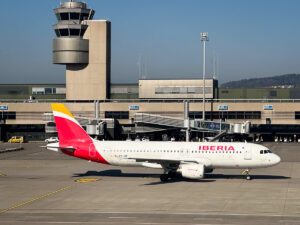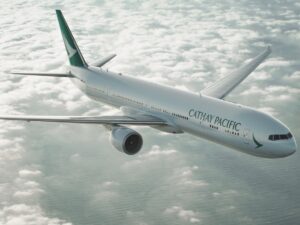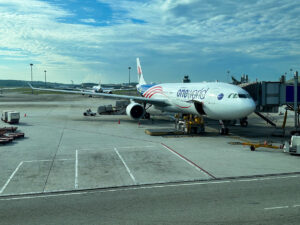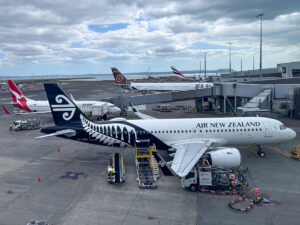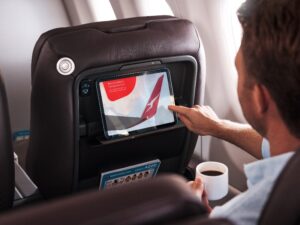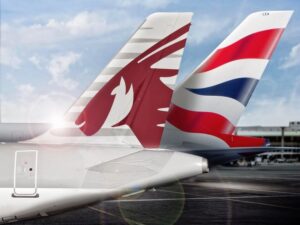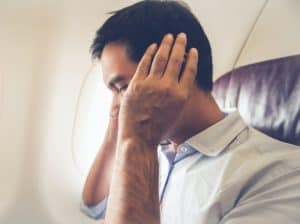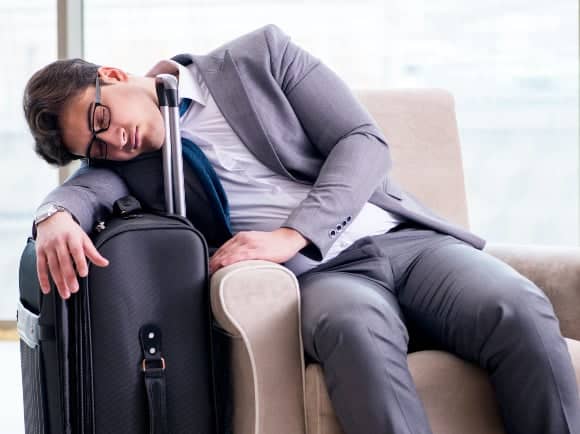
Airlines, hotels and other businesses that cater to corporate travellers will undoubtedly suffer if business travel does not recover. As a result, people will lose their jobs. But the old norms of business travel were unsustainable and created tired, depressed road warriors. Do we really want to return to exactly the way things were?
Business travel will be slow to recover
The pandemic, of course, is temporary. We will be able to travel again, and the recovery of business travel will soon begin. But there are predictions that corporate travel may never return to pre-pandemic levels.
After directing their employees to work from home since early 2020, many companies have discovered that a lot of work can be completed just as effectively remotely. Many workers have also enjoyed ditching their commute and working from home – at least some of the time. (The issue of working from home is discussed in a long-running AFF thread.)
Many companies have already reduced or banned business travel during the pandemic due to the health risk, cumbersome quarantine requirements, insurance complications or all of the above.
Even after a vaccine is found, it’s likely that many companies will continue to slash travel budgets for some time due to the recession. And with the pandemic proving that many face-to-face meetings can be conducted over Zoom instead, there are now fewer reasons to justify travelling for work.
This is one of the biggest fears of airline executives, who can no longer rely on high-yielding business travellers to fill premium aircraft cabins.
Pros & cons business travel
Of course, there are many benefits to business travel. They go far beyond the numerable advantages to the business itself.
During the last decade, a U.S. study estimated that business travel contributed to 3% of America’s GDP and 7.1 million jobs in the United States alone. Strong demand for corporate travel creates jobs not only at airlines and hotels, but throughout the entire business travel supply chain. The economic benefits cannot be underestimated.
But there are also downsides to lots of travel – both for society and individuals.
One particularly pressing issue in recent years has been the carbon emissions generated by all those flights. Some airlines have pledged to achieve carbon neutral growth and introduced carbon offset schemes, and the aviation industry is investing in sustainable fuels. But the overall level of growth in aviation over recent decades has been environmentally unsustainable.
That’s well-known, but impact of ultra-frequent travel on the “road warriors” themselves is discussed far less often. According to a 2015 study by researchers in Sweden and the UK called “A darker side of hyper mobility”, many high-flying corporate travellers were actually sicker, more stressed, lonelier and ageing faster due to their frequent travel.
The effects of very frequent travel reach far beyond just jet lag, according to the study. As well as an increased risk of heart attack, stroke and potentially dangerous levels of radiation exposure, this group of people are also statistically less likely to get enough exercise or eat healthily, as they are constantly on planes and staying in hotels.
The time spent travelling is rarely offset by a reduced workload, the study says, and business travellers also tend to be more stressed. For many, the experience can also be isolating and lonely. Relationships with friends and family can also suffer when business travellers are away often.
Do business travellers want to get back in the air?
The detrimental impact of frequent travel through time zones is startling, yet this is exactly what many business travellers (as well as flight attendants and pilots) have had to contend with until now. “Hypermobility”, as the study calls it, is rarely as glamorous as it looks.
The lockdown has proven that video conferencing and remote work can be effective, so do we really want to return to the old “normal”? It depends who you ask…
There seems to be two types of business travellers:
- Those who chose their job for the travel perks, and
- Those who view travel as a burden but do it because they have particular expertise in a job that happens to require travel.
Of course, there will be some that fit into both categories – that’s a happy marriage. But for business travellers in the latter group, this period of reduced travel may have come as a welcome break.
But there are certainly lots of once-frequent flyers that miss the regular travel. They may complain about the early starts, long hours and uncomfortable aircraft seats; but deep down, many frequent flyers do enjoy the travel immensely.
While researching this article I spoke to AFF member Sprucegoose, a Qantas Platinum One member who is an executive at a multi-national company. Before COVID-19, he would take several international business trips each year and flew between Sydney and Melbourne weekly. While he enjoyed all of the travel, he says he’s really noticed a difference since slowing down in March.
“Upon reflection I wondered where all the energy to achieve my routine came from,” this frequent flyer told me.
“On the very few occasions I have returned to Melbourne since and taken local holidays I have driven and found the experience to be mind cleansing and meditative to say the least. I now care more for my personal health and realise the pursuit of travel on that level takes real energy.”
Video conferencing is no substitute for face-to-face meetings
For airlines, hotels and the corporate travel industry, there is a silver lining. While many businesses have embraced remote work and video conferencing technology during the pandemic, others have found that virtual meetings are no substitute for meeting in-person.
For this reason, Virgin Australia CEO Paul Scurrah is cautiously optimistic that business travel will recover – albeit slowly. While he admits there will be business travel substitution “on the margins”, with people less likely to take a day trip just for one meeting, he believes things will eventually return to how they were before.
Scurrah recently told the Australian Aviation podcast that they’ve noticed a big increase in productivity among their own staff when they’ve been physically together in the office.
“We’ve got people who are involved in the project to stand us back up again who are from all different parts of the country, and a number of those have made the decision to go through the pain of hotel quarantine in Brisbane,” Scurrah said.
“For a large period of time we were doing work with them on Teams or Zoom. And once they’ve gotten through quarantine, and they’re in the office, the amount of productivity increase is quite surprising. The things you can just get done by being in the same place is a surprising factor of that.”

On the future of business travel, Sprucegoose agrees there will be less of it but doesn’t believe it will be eliminated.
“We will not totally substitute travel for video links, as humans will always crave the social, personal and professional interaction – it just wont be in the abundance we did previously,” Sprucegoose said.
Other Australian Frequent Flyer members agree that video conferencing is simply no substitute for face-to-face meetings. jakeseven7 is currently completing an online training course over Webex, and says the class is “dire”:
No interaction, no commentary, people just tuning in, video off, mute on, no questions, just ticking the boxes – and it is supposed to be a top rated course that people fight to get on, but zero energy from anyone (to be honest myself included).
Online delivery is just souless. I can see how great this course could be though, was supposed to be in Singapore with all people from the region flying in, interactive, making networks with other high potentials etc.
Similarly, daft009 struggles to see how online meetings could replace large-scale trade fairs and conferences.
I’ve booked flights for a trip to Frankfurt in June 2021..lets see how things go.
Its an exhibition spread over 130,000m2 of floor space… can’t do that virtually! I can meet all my suppliers at one place, rather than me going to each company separately all over Western Europe. Face to face cannot be beat!
It may seem like the travel shutdown has dragged on for a long time. But borders will reopen and travel will return at some point. When it does, many of us will probably travel less – and that’s not necessarily a bad thing.
I’ll give the final word to Sprucegoose:
The appreciation for what travel can bring will not be undiminished, I expect it to be more appreciated, treasured and measured.
You can join the discussion on the long-term corporate travel outlook on the Australian Frequent Flyer forum: Less Corporate Travel Long Term?
